|
|
|
Sort Order |
|
|
|
Items / Page
|
|
|
|
|
|
|
| Srl | Item |
| 1 |
ID:
089864
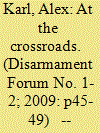

|
|
|
|
|
| Publication |
2009.
|
| Summary/Abstract |
In 1967, when the space age was still in its infancy, the Outer Space Treaty entered into force with the aim to protect the common interest of all societies while regulating the competition for military advantage that dominated the pioneering space programmes of the United States and the Soviet Union. The treaty was amended four times in the following 12 years with the introduction of the Rescue Agreement, the Liability Convention, the Registration Convention and the Moon Agreement.
|
|
|
|
|
|
|
|
|
|
|
|
|
|
|
|
| 2 |
ID:
132831
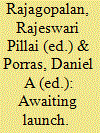

|
|
|
|
|
| Publication |
New Delhi, Observer Research Foundation,
|
| Description |
275p.Pbk
|
|
|
|
|
|
|
|
|
|
|
|
Copies: C:1/I:0,R:0,Q:0
Circulation
| Accession# | Call# | Current Location | Status | Policy | Location |
| 057859 | 358.8/RAJ 057859 | Main | On Shelf | General | |
|
|
|
|
| 3 |
ID:
179861
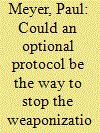

|
|
|
|
|
| Summary/Abstract |
Since the early 1980s, the United Nations General Assembly and its affiliated forum, the Conference on Disarmament in Geneva, has had the Prevention of an Arms Race in Outer Space issue on its agenda. In the intervening years, the threat of weapons being introduced into the outer space realm has waxed and waned, but, in the main, a benign environment free from man-made threats has prevailed, allowing for great strides in the exploration and use of space. Recently, a renewal of great power rivalry including the development of offensive “counter-space” capabilities has resurrected the spectre of armed conflict in space. With widespread political support for the non-weaponization of outer space, has the time come to give legal expression to this goal by means of an optional protocol to the 1967 Outer Space Treaty?
|
|
|
|
|
|
|
|
|
|
|
|
|
|
|
|
| 4 |
ID:
098143
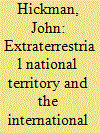

|
|
|
|
|
| Publication |
2010.
|
| Summary/Abstract |
Analysis of the probable effects of ending the prohibition against sovereign national extraterrestrial territory in the Outer Space Treaty points to large increases in the total territories of a small number of spacefaring states as they compete in a succession of annexations that move from celestial body to celestial body. Rather than result in an increased chance of war between spacefaring states-an argument deployed by defenders of the Outer Space Treaty-extraterrestrial annexations would instead reduce its likelihood, both in the near-term because of the mutual vulnerability of human spacecraft and bases, and over the long-term by making spacefaring states less vulnerable to terrestrial warfare.
|
|
|
|
|
|
|
|
|
|
|
|
|
|
|
|
| 5 |
ID:
169305
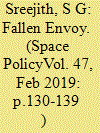

|
|
|
|
|
| Summary/Abstract |
This article revisits the legal status of astronauts by recounting the tale of their rise and fall in the International Space Law (ISL). ISL in its early years declared astronauts as envoys of mankind, although it later on entered into a state of forgetfulness of the term, replacing it with the more contemporaneous term “personnel.” Personnel brought a sense of everydayness and pragmatism to ISL as against the idealism attached to astronauts and to their status as the envoys of mankind's romantic collective. Spotlighting on this shift, this article argues that the term astronaut has, in fact, a semiotic effect in ISL that constantly evokes proud memories of human conquest of outer spaces. That is to say, in bestowing astronauts with the status of envoys of mankind, ISL mainly meant to record the remarkable feat of that day rather than actualizing astronauts in the deontological landscape of law. Later on, mindful of the burgeoning space activities and the need to regulate them, ISL espoused the term personnel to refer to space travelers. Today ISL governs the activities of personnel, whereas astronaut has a logocentric presence therein. Drawing on a relevant understanding of contemporary society and culture, the article concludes that astronauts have a legacy in law and society—they continue to exist as a cultural symbol in society and as a symbol of a culture in ISL.
|
|
|
|
|
|
|
|
|
|
|
|
|
|
|
|
| 6 |
ID:
151226
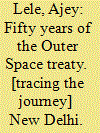

|
|
|
|
|
| Publication |
New Delhi, Pentagon Press, 2017.
|
| Description |
xii, 217p.hbk
|
| Standard Number |
9788182749481
|
|
|
|
|
|
|
|
|
|
|
|
Copies: C:2/I:0,R:0,Q:0
Circulation
| Accession# | Call# | Current Location | Status | Policy | Location |
| 058954 | 520.954/LEL 058954 | Main | On Shelf | General | |
| 058955 | 520.954/LEL 058955 | Main | On Shelf | General | |
|
|
|
|
| 7 |
ID:
110123
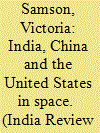

|
|
|
| 8 |
ID:
169337
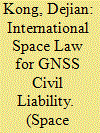

|
|
|
|
|
| Summary/Abstract |
GNSS-related activities qualify as ʻspace activities’, and it thus make international space law applicable. However, it is quite reticent to broadly interpret GNSS signals under the term ʻspace object’, due to the lack of material and physical properties. The discussions on whether GNSS damage qualifies as indirect damage, and whether the Liability Convention cover that indirect damage, are irrelevant to the applicability of GNSS damage to the outer space treaties. GNSS damage may apply Article VII of the Outer Space Treaty and the Liability Convention as long as the causal link between the damage and GNSS satellites (not GNSS signals) is unbroken, logical, foreseeable and not too remote under the sense of general international law.
|
|
|
|
|
|
|
|
|
|
|
|
|
|
|
|
| 9 |
ID:
157167
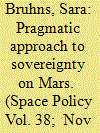

|
|
|
|
|
| Summary/Abstract |
Rising interest in Mars colonization from both private and public sectors necessitates a renewed discussion about sovereignty in space. The non-appropriation principle of the Outer Space Treaty currently prohibits any sovereign claims to celestial bodies, but it remains unclear how this principle should be applied to the peaceful colonization of Mars. Here we develop a pragmatic approach to guide the settlement of Mars, which is based upon a “bounded first possession” model with mandatory planetary parks. Scientists, experts, and leaders will establish planetary park locations and regulations through worldwide community solicitation in order to protect sites of scientific, aesthetic, historical, cultural, environmental, spiritual value. Colonization parties may occupy limited plots of martian land and may claim exclusive economic rights within this zone, while still refraining from any claims to sovereignty. All colonists remain under the legal jurisdiction of their host nation, with conflicts to be resolved diplomatically or through a temporary tribunal system composed of representatives from other Mars colonies. We also propose the formation of a Mars Secretariat as an administrative body with limited power to facilitate communication among parties. Our model for Mars colonization remains consistent with the Outer Space Treaty, but we also recommend revisiting or amending the non-appropriation and province of mankind principles to resolve the ambiguity of how nations, corporations, and individuals may utilize the resources of space.
|
|
|
|
|
|
|
|
|
|
|
|
|
|
|
|
| 10 |
ID:
172840
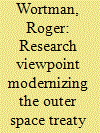

|
|
|
|
|
| Summary/Abstract |
Article II of the Outer Space Treaty requires a re-examination for applicability to the modern operating environment of space. This paper conducts this examination and analyzes multiple strategic visions for new approaches to national appropriation in space. Using Strengths, Weaknesses, Opportunities, and Threats analytic methodology, four approaches to a rewrite of Article II are compared to determine a method most applicable for space activities. Variables used to assess each approach focus on palatability of member states to agree and ratify changes to Article II, as well as appropriate change to ensure Article II is modernized for today’s space industry. The results of the research reflect that both United Nations’ oversight through a strict allocation program and a non-regulated free prospecting model to encourage innovation are optimal. These approaches diverge in ideology and vision for how space should be regulated, though both reflect an appropriate level of change and opportunity for the space industry. Also, these two approaches minimize confusion by providing clear guidelines for resource and territorial rights. The analysis herein shows that a rational approach can be implemented when analyzing possible rewrites for Article II. On this basis, it is suggested that the United Nations conduct its own analysis to ensure the space industry is properly regulated.
|
|
|
|
|
|
|
|
|
|
|
|
|
|
|
|
| 11 |
ID:
171216
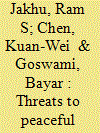

|
|
|
|
|
| Summary/Abstract |
This paper situates the ongoing debate and recently changing political narrative around the fundamental principle of “peaceful purposes” as enshrined in the Outer Space Treaty. The origins and evolution of the meaning of peaceful purposes are discussed. Further, the paper advances arguments on numerous fronts for the international community to not fall for the misinterpretation of the Outer Space Treaty that is proffered by actors advocating for non-peaceful uses and for making outer space a warfighting domain. In this context, practical suggestions on ways to preserve outer space for peaceful purposes are advanced.
|
|
|
|
|
|
|
|
|
|
|
|
|
|
|
|
| 12 |
ID:
167855
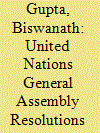

|
|
|
|
|
| Summary/Abstract |
The launch of Sputnik in 1957 followed by Explorer in 1958 showcased the potential of space and stressed the need for a robust body of law legislating space as beneficial to all states. Following the launches, a series of resolutions by the United Nations’ General Assembly developed the core principles of international space law. This article conducts an analysis of resolutions passed from 1957 to 1967 to understand the genesis of space law principles as reflected in the Outer Space Treaty of 1967. These principles include sovereign equality, peaceful purposes and international cooperation, non-appropriation of space, common heritage of mankind, environmental protection, and how to address non-governmental entities engaged in space activities.
|
|
|
|
|
|
|
|
|
|
|
|
|
|
|
|
| 13 |
ID:
084181
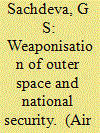

|
|
|
| 14 |
ID:
122510
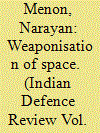

|
|
|
| 15 |
ID:
120099
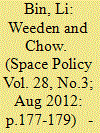

|
|
|
|
|
| Publication |
2012.
|
| Summary/Abstract |
The paper, 'Space sustainability through the sustainable management of common-pool resources: a framework and potential policies' by Brian Weeden and Tiffany Chow, researches Long-Term Sustainability issues (LTS) from the perspectives of both economics and governance, focusing on analyzing Elinor Ostrom's principles, and puts forward the main elements for a management regime. Their paper will be helpful for the international community to understand the importance of LTS, to further discussions in this field and even to shape a framework for tackling LTS. On the other hand, some of the principles raised by Ostrom still need to be clarified and deliberated throughout the international community. This commentary will analyze some of Ostrom's principles from the perspective of the 1967 Outer Space Treaty (OST) and put forward the values LTS should encompass based on an analysis of its relations with provisions in the OST.
|
|
|
|
|
|
|
|
|
|
|
|
|
|
|
|
|
|
|
|
|